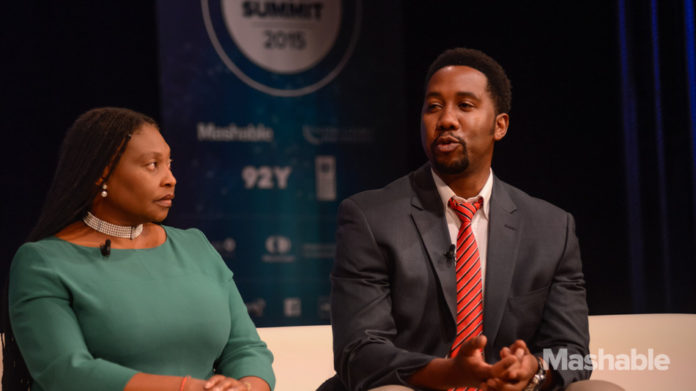The stigma around AIDS still blocks progress

When Ndaba Mandela’s father died in 2005, his family gathered to discuss what to tell the media. In a high profile family, the bloodline of South African anti-apartheid revolutionary Nelson Mandela, media was always a concern. But that was true especially now, given that Ndaba’s father died of AIDS.
When the family gathered, including Nelson Mandela, to discuss what the announced cause of death would be, one of Ndaba’s cousins suggest to say it was tuberculosis or pneumonia. But Nelson Mandela wanted the truth to be known.
“He said, ‘No, we’re not going to say it was pneumonia,’” Nd. Mandela remembered. “‘We’re not going to say it was anything else. We are going to say it was HIV/AIDS. It’s as simple as that.’”
The message behind the truth was simple, Nd. Mandela said: It was a necessary step in stopping the stigma and shame of HIV/AIDS.
Mandela, who serves as chairman of Africa Rising Foundation, recounted the story at the 2015 Social Good Summit on Sunday in a panel on the importance of HIV/AIDS activism. Mandela was joined in conversation by moderator Ayman Mohyeldin, NBC News foreign correspondent and MSNBC anchor. Fellow panelists Yvonne Chaka Chaka, South African singer-songwriter and global health advocate, and Luiz Loures, executive director of UNAIDS, also contributed to the conversation.
Loures was a physician in New York when he first encounter the AIDS virus. He said there were days when he could not leave the hospital because his colleagues would not serve his patients living with HIV/AIDS — the stigma was so deep. He credits activism with helping to curb that stigma and furthering scientific advancements in the fight against AIDS.
“The response of science, what you see in the news today as progress, was in response to the activism,” he said. “If it was not for mainly the gay men in New York, in San Fransisco, in other parts of the world that started to mobilize in response to this epidemic, we would not be where we are today.”
Nb. Mandela not only lost his father to AIDS, but also his mother two years earlier. For his mother, it was only two months from diagnosis to death.
“There was a huge stigma,” he said about her death. “You weren’t able to talk about it.”
Stigma was also a thread throughout a panel Monday, featuring actress Charlize Theron in conversation with Kweku Mandela, co-founder Africa Rising Foundation. In their conversation about what it will take to end AIDS, Theron recounted growing up in South Africa when the AIDS epidemic was at it’s peak.
“There was definitely a time in my life where I thought I was going to die of AIDS because I knew so many people dying from AIDS,” she said. “When I learned the truth about HIV and how it’s completely preventable, I always knew that’s what I would work in.”
She added: “I always believe there’s hope in anything that feels hopeless.”
Theron said that growing up, sex was a taboo topic of conversation. The shame associated with it kept young people quiet — and she wanted to change it. So she started the Charlize Theron Africa Outreach Project, an organization working to break down the stigma around sexuality and HIV/AIDS.
When she visited Africa with CTAOP for the first time, the young people in the sexual health outreach program coordinated by the group didn’t ask questions. Theron was worried. It was a sign that the stigma was still strong. But, when she came back seven months later, there was a heartening moment.
“The volunteer up front was holding a female condom — which is basically a tent,” she said. “She was explaining how to use a female condom. And I remember I heard [a 16-year-old boy] asking if he could use a female condom for anal sex. I was so moved because that never happened when I was growing up. People never felt safe to talk in that manner.”
Theron is helping to fight AIDS stigma through reaching those it most impacts, which Chaka Chaka said in the earlier panel is of major importance to any movements working within AIDS activism. But she clarifies that listening to what those populations need is key.
“People know their problems,” she said. “People know their solutions.”
There is clearly still work to be done, but Theron said she is concerned at the lack of urgency behind the current state of the movement. The attention just isn’t where it once was. But she’s committed to reinvigorating longtime activists — and supporting a new generation who are enthusiastic to help eradicate AIDS.
“I really feel that my generation and your generation can really be the ones that end AIDS,” Theron said in her panel. “This is not a tagline. It’s something I actually really believe.”
Have something to add to this story? Share it in the comments.
About Social Good Summit
The Social Good Summit is a two-day conference examining the impact of technology and new media on social good initiatives around the world. Held during U.N. Week on Sept. 27 and 28, the Social Good Summit unites a dynamic community of global leaders and grassroots activists to discuss solutions for the greatest challenges of our time.
This year’s summit is brought to you by Mashable, the United Nations Foundation, the UNDP and the 92nd Street Y. For complete event details, visit here.
